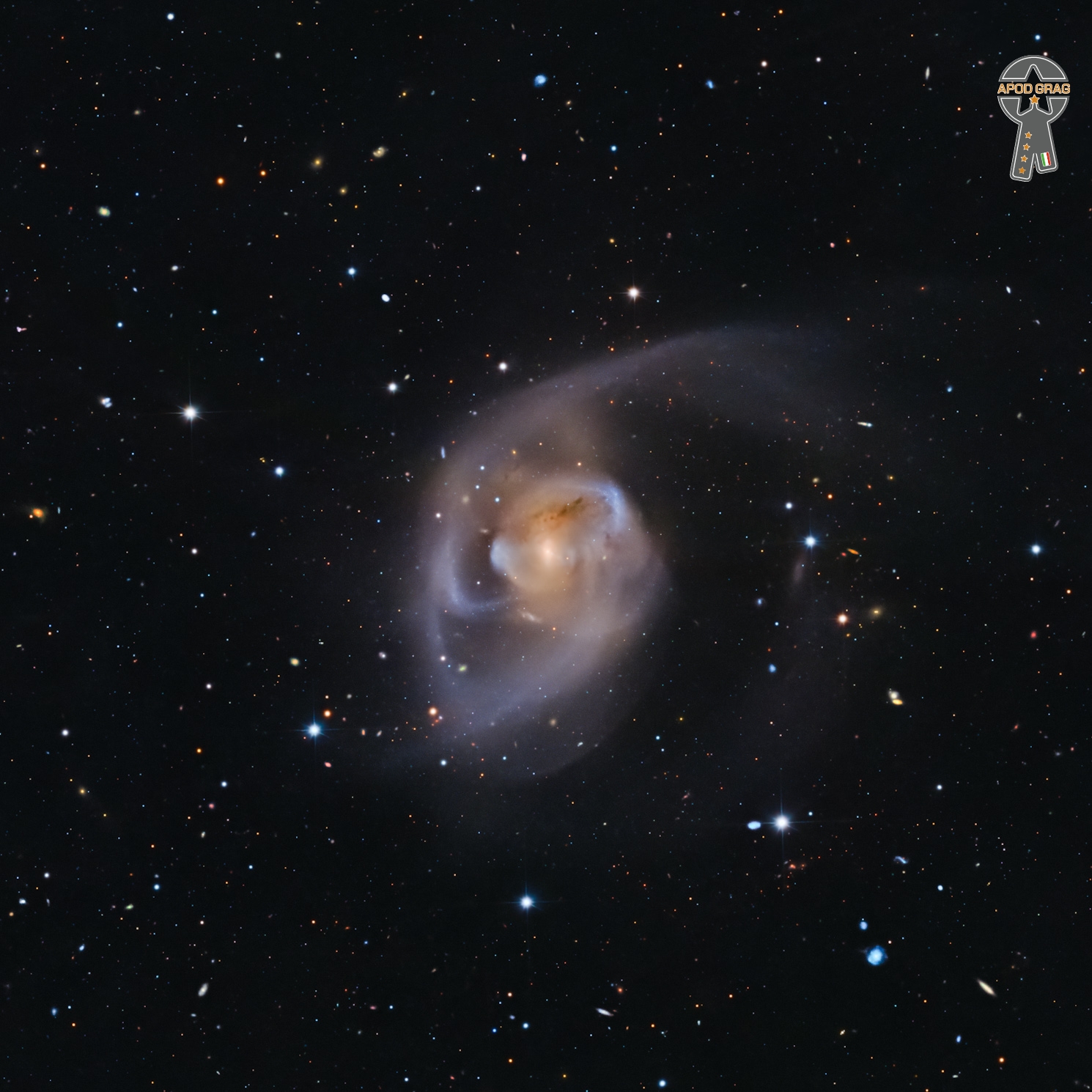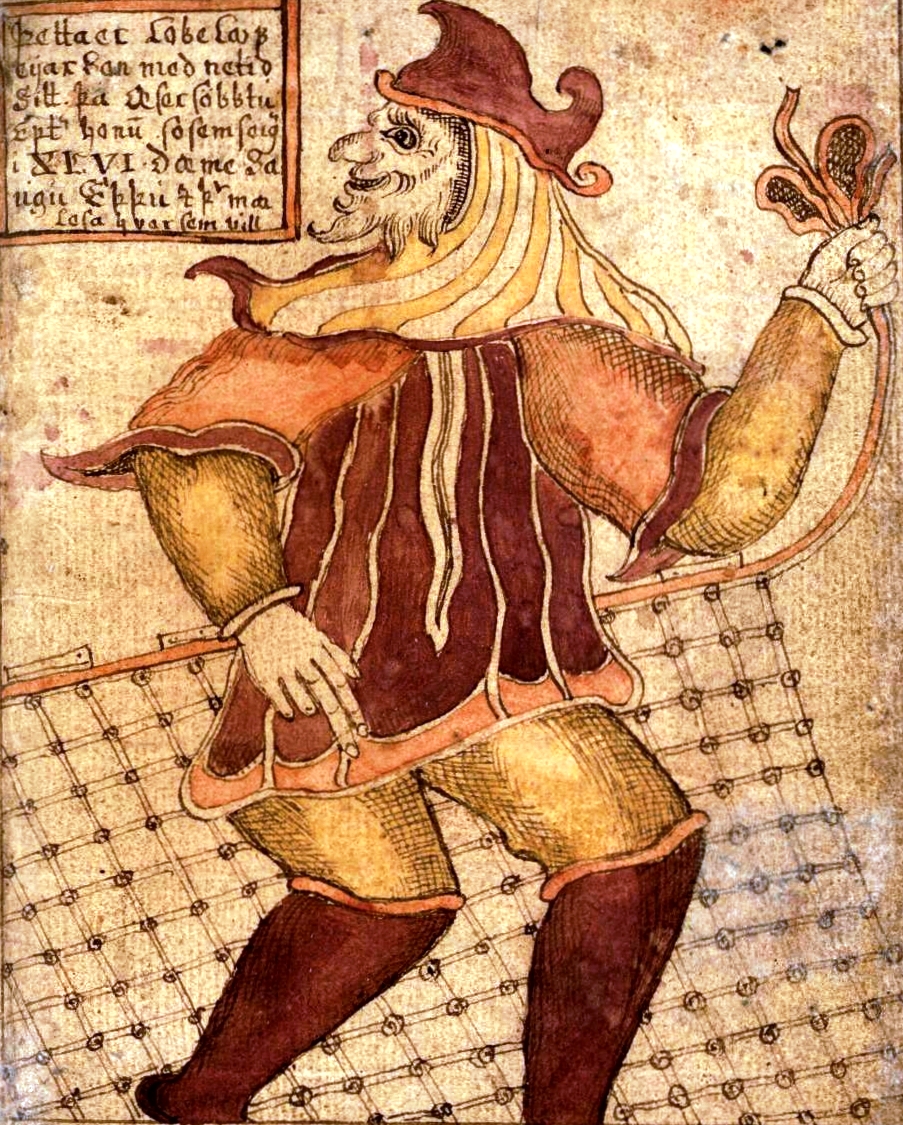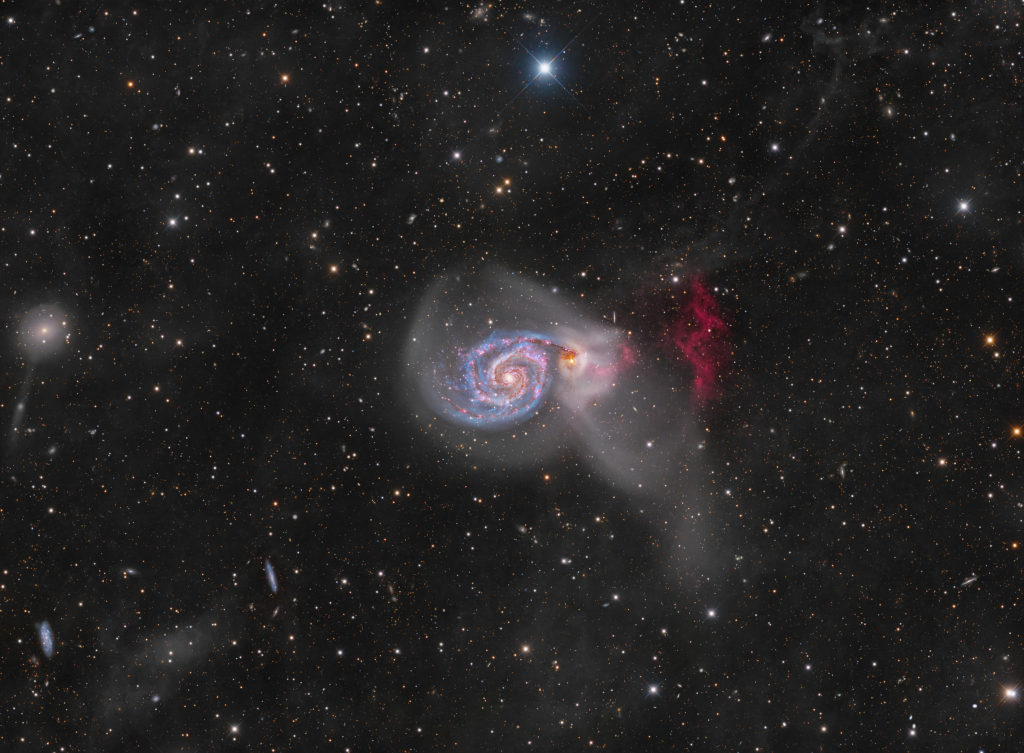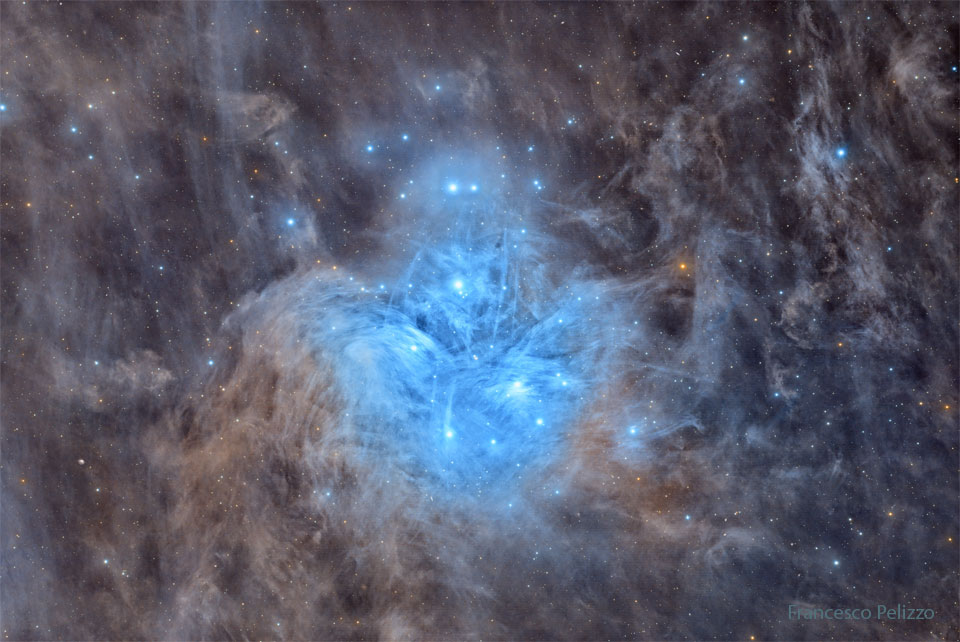Blog
This deep-sky image showcases NGC 7727, a stunning interacting galaxy located approximately 89 million light-years away in the constellation Aquarius. Captured from the pristine skies of Obstech Observatory, Chile, this image reveals the intricate tidal streams and fine details of this galactic merger.
Using a PlaneWave CDK 17 telescope, I aimed to highlight the complex structure of NGC 7727, including its disrupted spiral arms and faint outer halo. The extended exposure time allowed for the capture of subtle details, emphasizing the gravitational dance of the two merging galaxies and the stars being drawn out into the surrounding space. This deep capture not only illustrates the beauty of cosmic interactions but also serves as a reminder of the dynamic and ever-changing universe.

Christopher William Parkening (born December 14, 1947 LA, CA) is an American classical guitarist. He holds the Chair of Classical Guitar at Pepperdine University under the title Distinguished Professor of Music. Parkening has recorded over 20 albums for Angel and EMI Classics. He has been nominated twice for a Grammy Award. Notable recordings include Parkening Plays Vivaldi featuring a selection of Baroque concertos, Pleasures of Their Company with soprano Kathleen Battle, produced by Patti Laursen and nominated for the 1986 Classical Record of the Year Grammy Award as well as the world premiere recording of Peter Warlock‘s Capriol Suite with the Academy of St. Martin in the Fields.
more...Phineas Newborn Jr. (December 14, 1931 – May 26, 1989 Whiteville, TN) was an American jazzpianist, whose principal influences were Art Tatum, Oscar Peterson, and Bud Powell. Before moving on to work with Lionel Hampton, Charles Mingus, and others, Newborn first played in an R&B band led by his father on drums, with his brother Calvin on guitar, Tuff Green on bass, Ben Branch and future Hi Records star Willie Mitchell. The group was the house band at the now famous Plantation Inn Club in West Memphis, Arkansas, from 1947 to 1951, and recorded as B. B. King‘s band on his first recordings in 1949, as well as the Sun Records sessions in 1950. They left West Memphis in 1951 to tour with Jackie Brenston as the “Delta Cats” in support of the record “Rocket 88“, recorded by Sam Phillips and considered by many to be the first ever rock & roll record (it was the first Billboard No. 1 record for Chess Records). Before moving on to work with Lionel Hampton, Charles Mingus, and others, Newborn first played in an R&B band led by his father on drums, with his brother Calvin on guitar, Tuff Green on bass, Ben Branch and future Hi Records star Willie Mitchell. The group was the house band at the now famous Plantation Inn Club in West Memphis, Arkansas, from 1947 to 1951, and recorded as B. B. King‘s band on his first recordings in 1949, as well as the Sun Records sessions in 1950. They left West Memphis in 1951 to tour with Jackie Brenston as the “Delta Cats” in support of the record “Rocket 88“, recorded by Sam Phillips and considered by many to be the first ever rock & roll record (it was the first Billboard No. 1 record for Chess Records).
more...
Cecil Payne (December 14, 1922 – November 27, 2007) was an American jazzbaritone saxophonist born in Brooklyn, New York. Payne also played the alto saxophone and flute. He played with other prominent jazz musicians, in particular Dizzy Gillespieand Randy Weston, in addition to his solo work as bandleader. Payne began his professional recording career with J. J. Johnson on the Savoy label in 1946. During that year he also began playing with Roy Eldridge, through whom he met Dizzy Gillespie. His earlier recordings would largely fall under the swing category, until Gillespie hired him. Payne stayed on board until 1949, heard performing solos on “Ow!” and “Stay On It”. In the early 1950s, he found himself working with Tadd Dameron, and worked with Illinois Jacquet from 1952 to 1954. He then started freelance work in New York City and frequently performed during this period with Randy Weston, whom Payne worked with until 1960. Payne was still recording regularly for Delmark Records in the 1990s, when he was in his 70s, and indeed on into the new millennium.
more...Clark Virgil Terry Jr. (December 14, 1920 – February 21, 2015 St Louis, MO) was an American swing and bebop trumpeter, a pioneer of the flugelhorn in jazz, and a composer and educator.
He played with Charlie Barnet (1947), Count Basie (1948–51), Duke Ellington (1951–59), Quincy Jones (1960), and Oscar Peterson (1964–96). He was with The Tonight Show Band on The Tonight Show from 1962 to 1972. His career in jazz spanned more than 70 years, during which he became one of the most recorded jazz musicians, appearing on over 900 recordings. Terry also mentored Quincy Jones, Miles Davis, Herbie Hancock, Wynton Marsalis, Pat Metheny, Dianne Reeves, and Terri Lyne Carrington.
more...
Created with The GIMP
more...
An intriguing pair of interacting galaxies, M51 is the 51st entry in Charles Messier’s famous catalog. Perhaps the original spiral nebula, the large galaxy with whirlpool-like spiral structure seen nearly face-on is also cataloged as NGC 5194. Its spiral arms and dust lanes sweep in front of its smaller companion galaxy, NGC 5195. Some 31 million light-years distant, within the boundaries of the well-trained constellation Canes Venatici, M51 looks faint and fuzzy to the eye in direct telescopic views. But this remarkably deep imageshows off stunning details of the galaxy pair’s striking colors and fainter tidal streams. The image includes extensive narrowband data to highlight a vast reddish cloud of ionized hydrogen gas recently discovered in the M51 system and known to some as the H-alpha cliffs. Foreground dust clouds in the Milky Way and distant background galaxies are captured in the wide-field view. A continuing collaboration of astro-imagers using telescopes on planet Earth assembled over 3 weeks of exposure time to create this evolving portrait of M51.

more...
Joseph Lucian Messina (December 13, 1928 – April 4, 2022) was an American guitarist. Dubbed the “white brother with soul“, he was one of the most prolific guitarists in Motown Records‘ in-house studio band, the Funk Brothers.
Messina was born in Detroit on December 13, 1928. He started playing the guitarwhen he was thirteen, after his father purchased one for him. Messina initially attended Central High School in his hometown, before studying music at Cass Technical High School. He eventually dropped out to focus on becoming a professional musician.
Messina first played in jazz clubs in Detroit starting in the late 1940s. By his mid-twenties, he was playing in the ABC Television studio band, accompanying such guests as Sonny Stitt, Charlie Parker, Stan Getz, Jack Teagarden, Lee Konitz, Jimmy Giuffre, Pepper Adams, Donald Byrd, Frank Rosolino, and Dizzy Gillespie. Also while at ABC, Messina played on The Soupy Sales Show, alongside guests such as Miles Davis and Charlie Parker.
more...Benjamin M. Tucker (December 13, 1930 – June 4, 2013) was an American jazz bassist who appeared on hundreds of recordings. Tucker played on albums by Art Pepper, Billy Taylor, Quincy Jones, Grant Green, Dexter Gordon, Hank Crawford, Junior Mance, and Herbie Mann.
He was born in Tennessee. As bass player in the Dave Bailey Quintet in 1961, he wrote the instrumental version of the song “Comin’ Home Baby!“, first issued on the album Two Feet in the Gutter. Bob Dorough later wrote a lyric to the song, and the vocal version became a Top 40 hit for jazz singer Mel Tormé in 1962.
Tucker released the album Baby, You Should Know It (Ava, 1963) with Victor Feldman, Larry Bunker, Bobby Thomas, Ray Crawford, Tommy Tedesco, and Carlos “Patato” Valdes.
By 1972, Tucker owned two radio stations, WSOK-AM, which had over 400,000 listeners, and WLVH-FM. Both of these were located in his hometown of Savannah, Georgia. During the 1990s he owned a jazz bar in Savannah called Hard Hearted Hannah’s.
He died in a traffic collision in Hutchinson Island, Georgia, on June 4, 2013.
more...William Alexander “Sonny” Greer (December 13, c. 1895 – March 23, 1982) was an American jazz drummer and vocalist, best known for his work with Duke Ellington. Greer was born in Long Branch, New Jersey.
Greer started his career in his mid-teens when he began playing at resort hotels along the Jersey Shore with local orchestras. After a performance in the Plaza Hotel, he received an invitation to appear in Washington, D.C. with the Howard Theatre where he played for three years until he met Duke Ellington. Greer was balancing his commitments with Ellington and the Howard Theatre until the mid-1920s when he worked exclusively with Ellington.
Greer was Ellington’s first drummer, playing with his quintet, the Washingtonians, and moved with Ellington into the Cotton Club. As a result of his job as a designer with the Leedy Drum Company of Indiana, Greer was able to build up a huge drum kit worth over a then-considerable $3,000, including chimes, a gong, timpani, and vibes.
Greer was constantly on tour with the Ellington Orchestra and was there for its rise to fame in the 1930s and 1940s. Greer took the spotlight during the performances as the organization of his drum set drew the audience’s eyes. Music critic for the New York Times, John S. Wilson, wrote that Greer was “enthroned on a stand on which he was surrounded by a glittering array of paraphernalia.”Wilson continues to write that this included instruments such as chimes, tom-toms, snare drums, bass drums, and a gong that was “set up in back of him as though to form a massive halo.”
more...Carlos García Montoya (13 December 1903 – 3 March 1993) born in Madrid, Spain, was a prominent flamenco guitarist and a founder of the modern-day popular flamenco style of music. He was the nephew of renowned flamenco guitarist Ramón Montoya. He first learned from his mother, “la Tula”, and then from a neighboring barber, Pepe el Barbero, i.e. Pepe the Barber. After one year Montoya had completed what Pepe was able to teach him. Carlos left to learn what he could from other flamenco guitarists of the time. At fourteen he was playing in the “cafes cantantes,” in the heyday of flamenco singing and dancing, for such artists as Antonio de Bilbao, Juan el Estampío, La Macarrona and La Camisona in Madrid, Spain.
more...Perhaps the most famous star cluster on the sky, the bright stars of the Pleiades can be seen with the unaided eye even from the depths of a light-polluted city. With a long exposure from a dark location, though, the dust cloud surrounding the Pleiades star cluster becomes very evident. The featured 23-hour exposure, taken from Fagagna, Italy covers a sky area several times the size of the full moon. Also known as the Seven Sisters and M45, the Pleiades lies about 400 light years away toward the constellation of the Bull (Taurus). A common legend with a modern twist is that one of the brighter stars faded since the cluster was named, leaving only six of the sister stars visible to the unaided eye. The actual number of Pleiades stars visible, however, may be more or less than seven, depending on the darkness of the surrounding sky and the clarity of the observer’s eyesight.

Alejandro Neciosup Acuña (born December 12, 1944), known professionally as
Alex Acuña, is a Peruvian–American jazz drummer and percussionist. He has also worked as an educator at University of California, Los Angeles, and Berklee College of Music. LAMA, Musicians Institute, USC, CSUN.
Born in Pativilca, Peru, Acuña played in local bands such as La Orquesta de los Hermanos Neciosup from the age of ten. Acuña then followed his brothers and moved to Lima as a teenager. At the age of eighteen he joined the band of Perez Prado, and in 1965 he moved to San Juan, Puerto Rico. In 1974 Acuña moved to Las Vegas, working with artists such as Elvis Presley, The Temptations, and Diana Ross, and the following year he joined the jazz-fusion group Weather Report, appearing on the albums Black Market and Heavy Weather. While in New York City, Acuña recorded several songs under RCA records. Acuña decided to leave because of the genre limitations placed on him, in which RCA records only had him play Latin music.
more...Forrest Richard Betts (December 12, 1943 – April 18, 2024 West Palm Beach, FL) was an American guitarist, singer, and songwriter. He was best known as a longtime member of the Allman Brothers Band. A co-founder of the band when it formed in 1969, he was central to the group’s greatest commercial success in the mid-1970s, and was the writer and vocalist on the Allmans’ hit single “Ramblin’ Man“. The Allman Brothers Band broke up and re-formed twice, always with Betts in the lineup, until he left the band in 2000.
Starting in 1974, Betts also fronted his own bands, performing concerts and recording records. He released albums as Dickey Betts and Great Southern, the Dickey Betts Band, and under his own name.
more...
More Posts
- Buddy Miles
- John Cage
- Sunnyland Slim
- World Music with Canzoniere Grecanico Salentino
- Daily Roots with Lincoln Thompson & the Basses
- The Cosmos with M31/32/110
- Biréli Lagrène
- Gene Parsons
- Harold Shot Jackson
- Gerald Wilson
- Meade Lux Lewis
- World Music with Fanta Konatê
- Daily Roots with Lloyd & Glenn
- The Cosmos with NGC 7023
- Freddie King
- Mickey Roker
- Ernie Henry
- Memphis Slim
- Flamenco Fridays with José Mercé y Manuel Cerpa
- Daily Roots with Alton Ellis


